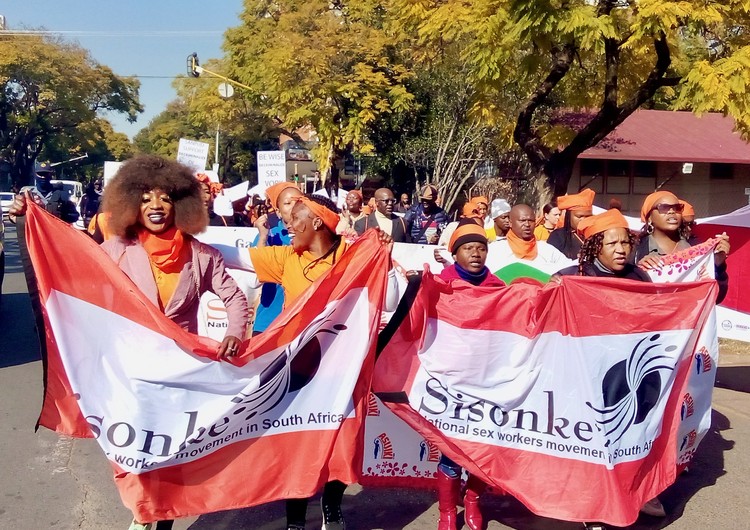Sex workers march to Lamola’s office over decriminalisation bill
The bill has been sent back to be revised after the state’s legal advisors flagged serious shortfalls
On Thursday, sex workers and activists marched to the justice department in Pretoria to demand that decriminalisation of sex work be fast-tracked. Photo: Chris Gilili
- Sex workers and activists marched to the Department of Justice in Pretoria on Thursday.
- They were demanding that government fast-track and finalise a bill to decriminalise sex work.
- The draft bill is being revised after the state’s legal advisors flagged serious flaws in it.
Over 100 sex workers and activists marched in Pretoria on Thursday to demand that government urgently finalise a bill to decriminalise sex work.
The group walked from Burgers Park, singing struggle songs and holding placards that read: “Be wise, decriminalize sex work”, “Sex workers have the right to be free from violence” and “My body is my business. Sex work pays my bills”.
They handed over a memorandum to the Department of Justice and Constitutional Development. Officials from justice minister Ronald Lamola’s office signed the memorandum and promised to respond within a week.
In May, the department revealed that Parliament’s draft bill to decriminalise sex work had been sent back to be revised after the state’s legal advisors flagged its shortcomings. The draft bill, which has gone through extensive public consultation, decriminalises sex work to ensure better protection for sex workers. However, it does not make provision for how changes in the legislation will impact existing regulations in various municipalities.
“I came to support the march because I also want sex work to be decriminalised,” said Thoko Mokoena. She said she has been a sex worker for more than 20 years.
“We’re being criminalised and police torture us. I have been pepper sprayed inside a police van, and they have poured cold water on me one night.”
She said that at health facilities “once you reveal that you’re a sex worker, the nurses have an attitude towards you”.
Mokoena said she is able to support her three children and her four siblings who are unemployed with the money she makes from sex work.
Sisonke national organiser Katlego Rasebitse said there is a lack of political will to decriminalise sex work. “While we wait, sex workers are being murdered daily and are still being policed. Their body autonomy is controlled by the state, especially black women. They face the brunt of police brutality,” said Rasebitse.
Addressing the marchers, Mmapaseka Steve Letsike, of the South African National AIDS Council (SANAC) Civil Society Forum, said, “Our message is very clear: government must decriminalise sex work. The Minister of Justice has made a commitment. We don’t want this process to be delayed any further.”
In a memorandum, the organisations state that the delay in policy reform is a cruel and unnecessary punishment by the Department of Justice: “It tortures us psychologically and undermines our right to dignity and equality. It cannot be correct that the department becomes a law unto themselves and unilaterally decides to postpone decriminalisation of sex work to the seventh administration”.
National Director of the National Association of People Living with HIV/AIDS, Mluleki Zazini said, “The more government delays decriminalisation, the more sex workers will suffer under the poor law enforcement system in this country. We are going to continue supporting the call of sex workers.”
Organisations that joined the march included Asijiki Coalition for Decriminalization of Sex Work, Sex Workers Education and Advocating Taskforce (SWEAT), Sisonke National Sex Workers Movement in South Africa, Show Me Your Number, Civil Society Forum, Access Chapter 2, and the South African National AIDS Council.
Next: Truck torched in Gqeberha electricity protest
Previous: I was expelled by corrupt leaders, says ousted NUMSA member
© 2023 GroundUp. This article is licensed under a Creative Commons Attribution-NoDerivatives 4.0 International License.
You may republish this article, so long as you credit the authors and GroundUp, and do not change the text. Please include a link back to the original article.
We put an invisible pixel in the article so that we can count traffic to republishers. All analytics tools are solely on our servers. We do not give our logs to any third party. Logs are deleted after two weeks. We do not use any IP address identifying information except to count regional traffic. We are solely interested in counting hits, not tracking users. If you republish, please do not delete the invisible pixel.



